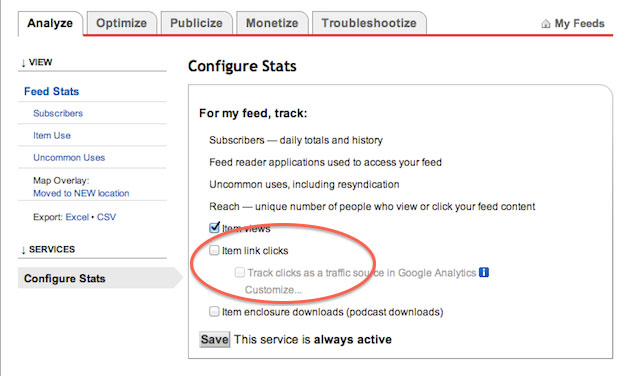I do most of my online reading through RSS, and I don’t think I’m alone. For the most part this is a good reading experience, but there are a few things publishers can do to make it even better. So if you publish a blog, here are three proposed guidelines for RSS feeds:
- Have an RSS feed and make it easy to subscribe. Contrary to popular belief, Twitter did not kill RSS. It’s alive and well. So please don’t bury or hide the feed — it should be easy to find the link and subscribe. Also, do some work on your feed – use a service like Feedburner to customize it (and give you analytics on your subscribers).
- Unless it’s central to your revenue model, don’t provide article excerpts only. I understand that there are subscription sites that require payment to get access to full RSS feeds — that’s a conscious business decision, so if it works, great! But for the rest of us, RSS excerpts are a bad idea. It places the burden on anyone following your shared items to click through to see the article, and that slows people down. As a general rule (with the above stated exception), please provide a full feed – you’ll grow your audience and eventually get those click-throughs because of it.
- Remove the metadata from your feed URLs. If I do click through to an article to comment, share it on Twitter, etc., a URL like this looks bad and makes sharing harder to track: http://uxmag.com/design/debating-the-fundamentals?utm_source=feedburner&utm_medium=feed&utm_campaign=Feed%3A+UXM
+%28UX+Magazine%29.The stuff after the “?” is added by Feedburner so you can get detailed analytics on item link clicks. But unless you really want to see where your RSS feed clicks come from you don’t need this level of detail. All you need to know is the number of Item Views in your feed — the rest of your analytics can come from Google Analytics. It’s very easy to turn this tracking off to remove the metadata and make your URLs more friendly. In Feedburner, go to “Configure Stats” and uncheck the “Item link clicks” box. Here’s a screen shot:

In Luke Wroblewski’s new project Future Friendly, they discuss their thinking around universal content:
Well-structured content is now an essential part of art direction. Consider how it can flow into a variety of containers by being mindful of their constraints and capabilities. Be bold and explore new possibilities but know the future is likely to head in many directions.
If you publish content on the web it’s not future friendly to ignore and/or limit its use in RSS, which is one of the most important containers we have at our disposal.